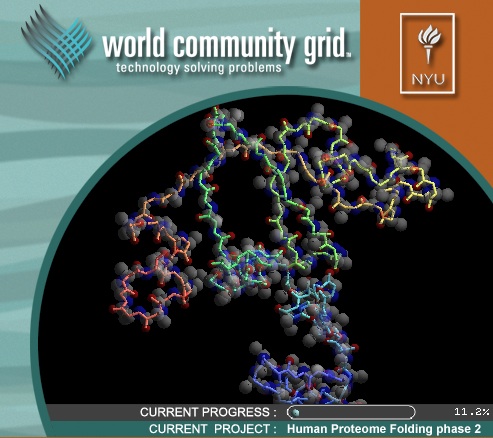You know how you never turn your computer off? You know how you have guilty pangs of conscious because you know you are wasting electricity? Well now you can feel a little better about wasting all those electrons. IBM and researchers from Harvard University are launching a new World Community Grid project to discover organic materials to create a more efficient and lower cost solar cell. The path-breaking effort will use idle computer power from volunteers to create large supplies of new clean energy.
Clean energy sources like solar could supply a vast amount of the world’s energy and help eliminate our dependence on fossil fuels, the cause of global warming, they could do so even faster if they were more efficient and could be developed at lower cost.
Current silicon based solar cells are only about 20 per cent efficient and cost about $3 per watt of electricity generated. A newer form of solar powered cells being developed is plastic not silicon based. It holds great promise because it is flexible, lightweight and most significant is much less costly to produce.
IBM will also pilot World Community Grid on a new IBM internal cloud, a network of services and software, when the cloud is not being fully used to provide more computing power to the grid. In the future, IBM plans to expand this capability to clients of IBM cloud computing services if they choose, so that they can become part of this humanitarian research.
“World Community Grid members will make this research possible because of the incredibly large amount of free computing power we will receive” said Alan Aspuru-Guzik, the principal investigator and a professor in the Department of Chemistry and Chemical Biology, at Harvard. “It would take us about 100 days of computational time to screen each of the thousands of compounds for electronic properties without the power of World Community Grid. Yet with World Community Grid’s free computing power, augmented by cloud computing, the project is estimated to complete in 2 years what would have taken 22 years to run on a regular scientific cluster”
The research hopes to discover and isolate organic molecules that when combined can convert more sunlight into electricity and thus produce solar cells much more inexpensively.
“IBM believes that this important new study powered by World Community Grid could provide the planet with a smarter solution to the problem of low cost solar technology” Stanley Litow, Vice President, IBM, Corporate Citizenship and Corporate Affairs and President of the IBM International Foundation. “This project marks an expanded direction to help our society by reducing our dependence on fossil fuels to make a lasting impact by hopefully finding new sources of clean energy”
World Community Grid is the largest public humanitarian grid in existence with more than 413,000-plus members who represent more than 200 countries and links to more than one million computers. It is the volunteers that help make the difference because as each one shares their computer time, scientists are able to conduct their research faster. For example,
* The Nutritious Rice for the World has already returned 10 million transactions and 9,000 years of compute time.
* The AfricanClimate@Home just completed its data collection and research analysis will now begin.
* Help Defeat Cancer received a $2.5 million grant from NIH to further deploy its system for cancer research.
* FightAIDS@Home completed five years of HIV/AIDS research in just six months.
To become of member of World Community Grid and donate unused computer time, individuals register on www.worldcommunitygrid.org and install a free, small, secure software program onto their computers. When computers are idle, data is requested from World Community Grid’s server. These computers then perform the computations, and send the results back to the server, prompting it for a new piece of work. A screen saver will tell individuals when their computers are being used.
